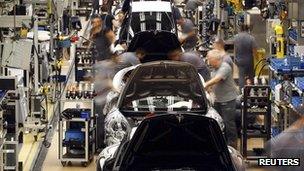Europe economy: Recession hits Italy and Netherlands
- Published

Europe's debt crisis has hit demand for German exports
Two of the eurozone's biggest economies have fallen into recession, according to the latest economic figures.
Italy and the Netherlands both saw their economies shrink by 0.7% in the fourth quarter, the second consecutive quarter of economic contraction.
Germany had its first negative quarter since 2009 with a decline of 0.2%, compared with the previous quarter.
But in France there was surprise growth of 0.2% at the end of last year, attributed to healthy export growth.
Overall the 17 nations that make up the eurozone saw economic activity shrink 0.3% in the fourth quarter. By comparison the United States reported growth of 0.7%.
The eurozone has not slipped into recession as it reported growth of 0.1% in the third quarter.
'Better than feared'
For 2011 as a whole, the French economy grew by 1.7% and Germany 3%.
Europe's debt crisis has already pushed Greece, Portugal and Belgium into recession, defined by two consecutive quarters of contraction.
Economists forecast that Germany is likely to avoid that scenario and say the latest growth figures could have been worse.
"This is better than feared after retail sales and industrial production turned out badly in December. The decline is due to the euro crisis. It caused a drastic loss in confidence among companies and consumers." said Christian Schulz, an economist at Berenberg Bank.
"Action from the ECB and the government has restored confidence. There is hope that we will emerge quickly from the economic dip. We expect growth again in the second quarter at the latest, provided that the euro crisis remains under control." he said.
Peter de Keyzer from BNP Paribas Fortis: ''Europe has de-coupled from the rest of the world''
The French growth figures were better than forecast, with many analysts having expected the economy to have contracted in the fourth quarter.
"Each of the three main components of the economy - foreign trade, household consumption and investment - had a positive contribution in the last quarter of 2011." said Finance Minister Francois Baroin in a statement.
"This strengthens the government's forecast for 0.5% [growth] this year."
That will come as a boost to President Nicolas Sarkozy who, if he chooses to run again, faces a national election in April.
Economists say that of Wednesday's figures, France was the most surprising.
"It boils down to a very positive net trade position in the fourth quarter, business investment has also been very positive. I'm not sure the pace can be maintained in the first half but at least it suggests that France, at worst, will go through a very shallow recession. " said Gilles Moec, Senior European Economist at Deutsche Bank.
Confidence in France was undermined in January when it lost its top-notch AAA credit rating, after one of the leading ratings agencies, Standard and Poor's, downgraded the nation's debt.
At the time the agency blamed Europe's debt crisis and the failure of Europe's leaders to tackle the region's problems.